- Home
- Vicki Delany
Gold Web Page 3
Gold Web Read online
Page 3
“A pleasure to meet you, sir,” I said. “Please enjoy our hospitality. Come, Angus.”
I left the disappointed count and, with Angus in my wake, navigated the crowd, nodding to customers I did not know, exchanging words of greetings to those I did.
“Whew!” I said when we reached the relative quiet of the space under the stairs. “Thank you for bringing this, my dear.” I accepted a kiss on the cheek and watched him make his way across the room and out the door.
I settled myself at my desk with a contented sigh and opened the parcel containing the food. Mrs. Mann had made sandwiches out of the remains of last night’s moose dinner. The texture of the meat might indicate that the creature had died of a highly advanced age, but the bread was fresh and she had not spared the application of sweet butter.
My mind returned to the man in the alley. The man who had died with my name on his lips. My feeling of contentment disappeared.
I am not entirely an uncaring person. I simply had not had time to spare him much further thought, what with wanting to scrub his blood from my person, dress for the evening, dash back to the Savoy to interrupt the police questioning of Angus, open the dance hall, check on Roland the Magnificent, and charm the customers.
All of that and it was scarcely nine o’clock.
I have a good memory for faces, a talent that has served me well, but try as I might I could not recall seeing the nameless man before. That he knew my name was not surprising — more surprising had he not known who I was. Surely it was nothing but a coincidence that he was set upon by assailants at the moment Angus and I exited the Savoy, taking a shortcut though the alley. Perhaps he, knowing he was about to expire, headed for me as he might for the arms of his mother or his nanny.
Culloden?
His dying word was not, as I had told the police, my name, but rather it had been Culloden.
The bloodiest of all battles. The end of the Jacobite Rebellion and the death of dreams of an independent Scotland. It might be possible that the man’s name was Culloden, but so sacred was the battlefield to the Scots I had never known that word to be a name. Was he perhaps from that area, dreaming of his homeland as he saw the gates of heaven swinging open and the long, thin finger of Saint Peter beckoning?
MacGillivray. Culloden.
When I was young, I walked the Black Cullins of Skye with my father, and I never tired of hearing how the MacGillivrays had fought to the last for the Bonnie Prince and Scotland, losing their all for the cause.
And would do so again, down through the generations.
That battle had been fought, and lost, in 1745. A long time ago, yet to some men, such as my father, it might have been yesterday. To me it was nothing but an old story, exciting to listen to on a cold, damp winter’s night seated around the peat fire in our white-washed croft or while tramping the bare brown and purple hills.
My parents were murdered when I was but a few days short of my eleventh birthday. Fleeing their killer, I left Skye in the company of a group of Travellers and have never returned to my stark beautiful homeland. I think of my parents — Fiona and Angus MacGillivray — often, but I haven’t thought of Culloden or the honour of the MacGillivrays since.
How strange that a dying man would link those names together.
I did not tell anyone, not Angus, certainly not the police, what the man’s last word had been. I decided it had no meaning.
My past has never been entirely, shall we say, respectable. Or even legal. I’ve built a new life here in the Yukon for Angus and me on a foundation of not-quite-the-entire truth.
I drummed my fingers on the desk.
To be totally honest, I must admit that I’ve built our new life on a foundation of almost total fabrication.
I fear that any questions about my origins, no matter how innocent they may at first appear, might start weakening that foundation.
I looked at the food laid out in front of me. I’d taken one bite. I wrapped up the remains of the sandwich and tucked it into the top drawer. Perhaps I’d have an appetite later.
I am not a religious woman, but I closed my eyes and said a silent prayer for the man, whoever he might be, who had died with my name on his lips.
5
“Stabbed, no doubt about it.” The doctor peeled off his gloves as he stepped away from the body laid out on the table in the back room of the mortuary. “Three times, at least. The first two got him in the side, lots of blood but not fatal, but the last slipped in between the ribs and struck the heart.”
“A good-sized knife then?” Richard Sterling asked.
“It had to be a long enough blade. And a sharp one.”
“Anything else you can tell us?” Inspector McKnight said.
“He was in his late forties, probably. Well nourished, at least as well as anyone of us up here. Not many teeth left and what he had are rotting, must have had a lot of pain from them. Nothing unusual.”
“Thank you, Doctor.”
The police took their leave and walked through town, heading toward Fort Herchmer, the NWMP post. “The first thing we need to do is find out who this fellow is. Was,” McKnight said.
“Agreed.”
“I’m not happy. The superintendent is not happy. The commissioner will be not happy when he hears. Not only was a man murdered in the streets in the middle of the day, but the culprit got away.”
“Five dollars in bills and some gold dust were in his pockets,” Sterling said. “Not a lot of money, but men have been killed for less. Yet he wasn’t robbed.”
“That might have been the intent, though. And when Mrs. MacGillivray and her son appeared they ran off.”
“I don’t know. The back alleys of Dawson are not quiet places, particularly behind the dance halls and so close to the river. People are coming and going all the time. Mrs. MacGillivray and Angus thought nothing of cutting down the alley.”
“A falling out between ne’er-do-wells,” McKnight said, his voice lifting.
“I don’t mean …”
“Yes, that’s what it was. Altogether too many vagabonds and layabouts in this town. Some petty argument between fellows with nothing better to do and someone draws a knife. Tsk tsk. The respectable citizenry have nothing to fear. Find the man responsible, American probably, altogether too many of them in town as well. We’ll hang him, and any of his accomplices, and prove Her Majesty’s forces are fully in command of this territory.”
“I …”
“What are you waiting for, Sterling? Get on with it. I want to see the scoundrels in the dock as soon as possible.”
Sterling stood on the boardwalk watching the inspector walk away, highly pleased with himself. McKnight was probably right and it shouldn’t be too difficult to find the dead man’s friend. Probably still wearing his bloody clothes and hoisting a few drinks in an attempt to forget what he’d done.
Still, never a good idea to rush to judgement.
He turned and, after nearly colliding with a plump matron, made his way back to the town detachment office. He’d get McAllen and FitzHenry visiting the dance halls, asking if anyone knew the dead man and who his friends might be.
Sterling himself should pay another call on Fiona MacGillivray. She was holding something back, although what she could tell him about the death of a total stranger he didn’t know.
He smiled to himself and straightened his hat.
He stopped in at the office first, to give his men their orders.
Constable FitzHenry was out, but McAllen was behind the desk, reading reports.
“You’re wanted, Corporal,” the young officer said, before Sterling could so much as open his mouth.
“As soon as possible.” McAllen lowered his voice, his eyes wide. “By Inspector Starnes himself. You’re to go to his house, not his office. Immediately. Come alone, the message said.”
* * *
The Savoy Saloon and Dance Hall is open twenty hours a day, six days a week. We are somewhat unusual in that as most of the othe
r places keep their doors open around the clock, save for compulsory closing to honour the Lord’s Day. I decided from the beginning I wanted to keep my eye on the place as much as possible. We could afford to shut our doors for a few hours after six a.m. when the percentage girls — those employed to dance with the men after the stage show ends at midnight — go home. The rule isn’t set in stone, and particularly if a big spender is on a losing streak in the gambling hall, we will stay open.
Even I can’t function well on less than four hours sleep a night. It’s my custom to go home at six after paying the girls for their night’s work. The stage performers get a set wage, but the percentage girls earn twenty-five cents for every dollar-a-minute dance. A small disk, which they place in their stockings, records each dance. By the end of the evening the legs of some of the more popular girls resemble those of African elephants.
Ray and the bartenders escort the last of the punters — some willing, some not — out the door, I settle up with the girls, we close, and I go home to bed. I manage to get about three hours sleep before rising to have a quick breakfast, then returning to the Savoy at ten o’clock when another round of eager men pour through the doors. I shut myself in my office, open the big ledger to do the accounts, and take the previous night’s take to the bank. Then it’s back home for whatever household chores need attending to, a bit of shopping perhaps, or helping Angus with his education (although I am running out of things to teach the boy) if he is not working down at Mr. Mann’s shop on the waterfront. A nap, if I’m lucky, and back to the Savoy at four as evening custom begins to build. Home again at six to change into evening gown, gulp down supper, and attempt to be back at seven when the dancers and performers and musicians begin arriving.
It’s an exhausting schedule, but I’m well aware that this gold rush won’t last forever — there’s talk of there not being all that much gold after all, and most of it already taken — and I intend to ensure I make as much money as I can while I can.
The morning after the unnamed man’s unfortunate demise in my arms, I left the Savoy for the bank, bearing a satisfyingly heavy bag. There are not many cities in the world where a woman could walk, unaccompanied and openly, through the streets, bearing a sack stuffed with cash and gold. Particularly as part of her regular routine, known to almost everyone in the vicinity. Dawson was perhaps the most peaceful, safest place I had ever lived. Not only did the NWMP keep the stamp of law and order firmly on the town, but should anyone attempt to break the law we were surrounded by nothing but wilderness, leaving the miscreants precious little opportunity to affect an escape.
Yet thoughts of the man yesterday, set upon by ruffians, intruded into my usual calm, and I hesitated at the front door. Murray, one of the bartenders, was serving a couple of customers, and the one I always thought of as Not-Murray was in the storage room. I could hear the roulette wheel turning, and Jake say “No more bets.” I considered waiting for Not-Murray to return and asking one of them to accompany me.
“Mornin’ Mrs. Mac.” Helen Saunderson bustled up the boardwalk. It had rained in the night, fortunately not too much, and the hem of her brown calico dress was not too terribly dirty. After a good rain the streets of this town, built on a flood plain at the convergence of two rivers, could be thick with mud high enough to reach a horse’s knees. “Gonna be a lovely day, ain’t it?” Helen stood beside me watching the ebb and flow of people. I felt like a fool, afraid to walk down the street.
Nothing but the usual lines of men heading for the Creeks, respectable women going about their family’s business, listless cheechakos looking for something — anything — interesting. Half-starved horses pulled wagons, men carried loads, stray dogs dodged around legs, human and equine.
I tightened my grip on the bag and walked the short distance — less than a block — to the bank, exchanging greetings with others.
The lineup at the Commerce Bank snaked along Front Street, men pushing and shoving, trying to edge themselves forward. I myself never wait in line. Almost as one, the men stood to attention as I passed, touching their caps or saying good morning.
“Wow, ’o’s that then?” I heard one chap, plucked straight from the filthy alleys of Whitechapel, say to his companion. “A duchess or som’think?”
The bank itself was not at all impressive, but it was an improvement over the tent it had occupied a short while ago. I sailed through the doors.
To my considerable surprise a woman stood in front of the teller’s window. Not that there are not a good number of women in Dawson, but few of them own businesses and thus have reason to frequent the bank. I stood behind her, as close as I could get without obviously snooping. Fortunately, she was quite short.
Over her shoulder I could see the teller counting money, a nice stack of bills by the look of it. He made notes in his ledger and signed a withdrawal slip with a whisk of his pen. He passed the money underneath the bars of his wicket along with the slip of paper. “Merci, madame. I ’ope you enjoy our fair town.”
She wore a practical, handsome costume of sage-green bodice and plum skirt. The collar of the shirt was high, the leg-of-mutton sleeves perfectly cut to flare out above her elbows and fit snugly below. The hem of the skirt was trimmed in matching green ribbon and the entire ensemble was spotlessly clean. Not an easy look to achieve in the muddy streets of Dawson.
“I’m sure I will,” she replied. Her accent was flat, very American. She wore beige gloves. She gathered up her money, tucked it into her reticule, and turned. Her eyes opened at the sight of me, standing a mite closer than was proper. Lovely eyes they were, as pale blue as ice on the distant glaciers in winter, large and lined with thick black lashes. Her face was a tiny pale heart accented by pink cheeks and plump red lips. Blond curls peeked out from beneath a plum bonnet and small pearls decorated ears the shape of perfect sea shells.
She dipped her chin. “Good day.”
I nodded in reply, and she slipped away. I heard the men behind me buzzing with questions. I had questions of my own.
“Who was that?” I asked as I hefted my bag onto the counter.
“An American lady,” the teller said, opening the wicket door to grab the bag. His shirt cuffs badly needed the services of a laundry maid. He chatted as he counted. “Miss Eleanor Jennings, of Chicago. She is ’ere to open a photography studio.”
“Photography?”
“Oui. Most unusual, non? A lady photographer. But in Dawson ladies do as they wish, non?”
“Indeed,” I replied, accepting the deposit slip he’d completed. I checked to ensure the amount matched my accounting and put the slip into my own reticule. “Good day.”
“Good day, Madame MacGillivray.”
When I got outside, after exchanging greetings with the men lined up behind me, I looked up and down the street. I couldn’t see the American woman, which was not much of a surprise as she was so tiny — perhaps not more than five feet tall — she would be swallowed up by a crowd of two.
A photographer. Several photographers had set up shops and were doing a roaring trade taking photographs of cheechakos posing as prospectors and selling scenic pictures to those wanting to send an image of the Yukon to their families back home.
I myself avoided them like I would a drunken gambler anxious to slobber his thanks across my face. I never posed for photographs, and if I were unlucky enough to be unwittingly captured in one I attempted, and usually succeeded, in convincing the photographer not to develop the image. On occasion I had had to buy the cursed thing and destroy it myself.
Influential people in London and Toronto might still be searching for me. Men can be highly vengeful, I’ve found, when a woman has taken advantage of them. What with people carrying the camera devices into the streets and taking photographs with ease, along with the incredible thirst of the Outside for news of the Klondike, I might be on one side of the world, yet my image could be reproduced in a newspaper on the other a mere weeks later.
Most distressing.
/> Sometimes I did not care for these modern inventions.
I vowed to stay well out of the way of Miss Eleanor Jennings of Chicago.
6
“There you are, my boy, I was told I could find you here.”
Angus glanced up from behind a stack of canned peaches. Most mornings, he worked at Mr. Mann’s shop down by the waterfront. Angus hated working in the shop. His mother insisted he help bring in some money, but he suspected her real intention was to keep him out of trouble. He’d heard rumour of a school starting up in August. He figured he was too old for school, but his mother put great store in education.
“Me, sir?” he said accepting the hand thrust across the counter. The man had a strong grip.
“You’re Angus, right? Mrs. McGillivray’s son?”
“Yes, sir. But I don’t know where my mother is.” He went back to stacking peaches. More than a few men tried to make Angus’s acquaintance thinking he’d provide a shortcut to his mother’s affections.
“I’m not looking for her. I wanted to meet you, that’s all. My name’s Roland. They call me Roland the Magnificent.” He had a strong English accent.
“They do?”
Roland laughed heartily. It was a nice laugh, deep and rolling and genuine. A laugh that didn’t take its owner too seriously. “I understand your confusion. Nothing particularly magnificent about me, is there?”
“No, sir. I mean …”
Roland laughed again.
He was an older man, perhaps about the age of Inspector McKnight, clean-shaven with a round belly, and no more than a few strands of greasy grey hair. His nose had red streaks running across it and was large, lumpy, and pitted. “Magnificent,” he said, “is my stage name. I’m an entertainer. A magician. I’ve the good fortune to be employed by your mother at the Savoy.”

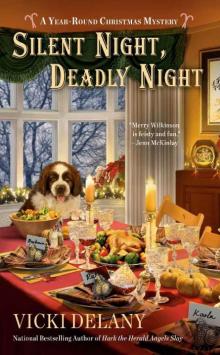 Silent Night, Deadly Night
Silent Night, Deadly Night Coral Reef Views
Coral Reef Views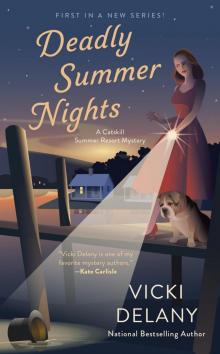 Deadly Summer Nights
Deadly Summer Nights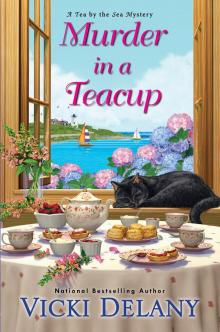 Murder in a Teacup
Murder in a Teacup Whiteout
Whiteout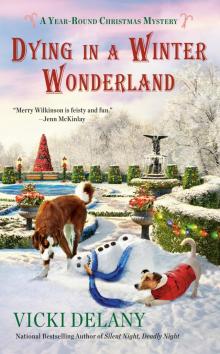 Dying in a Winter Wonderland
Dying in a Winter Wonderland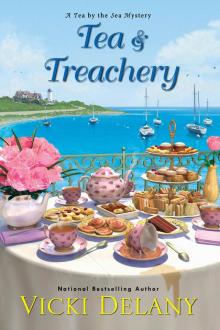 Tea & Treachery
Tea & Treachery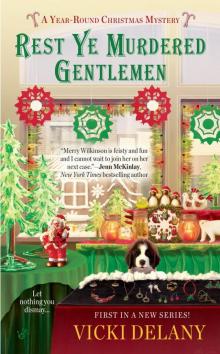 Rest Ye Murdered Gentlemen
Rest Ye Murdered Gentlemen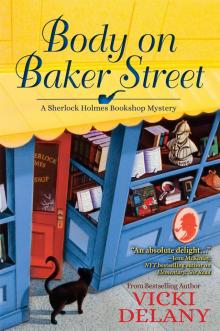 Body on Baker Street: A Sherlock Holmes Bookshop Mystery
Body on Baker Street: A Sherlock Holmes Bookshop Mystery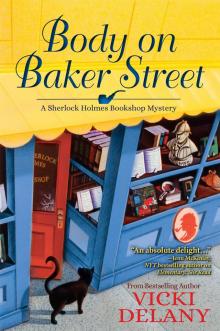 Body on Baker Street
Body on Baker Street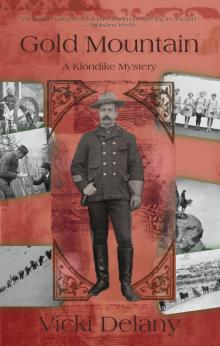 Gold Mountain
Gold Mountain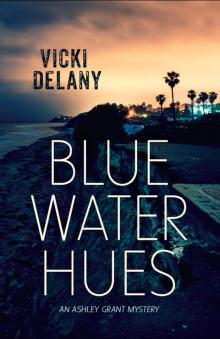 Blue Water Hues
Blue Water Hues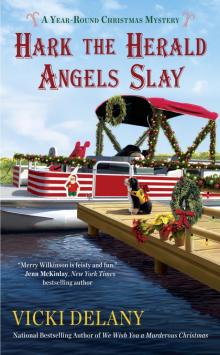 Hark the Herald Angels Slay
Hark the Herald Angels Slay Murder at Lost Dog Lake
Murder at Lost Dog Lake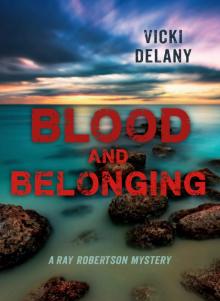 Blood and Belonging
Blood and Belonging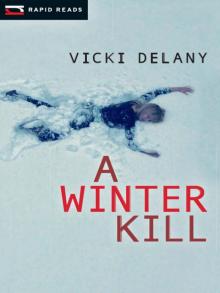 A Winter Kill
A Winter Kill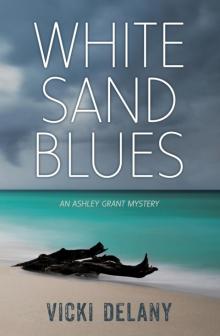 White Sand Blues
White Sand Blues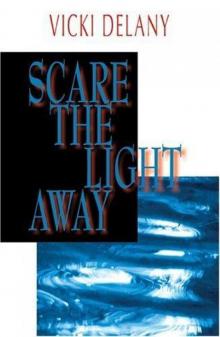 Scare the Light Away
Scare the Light Away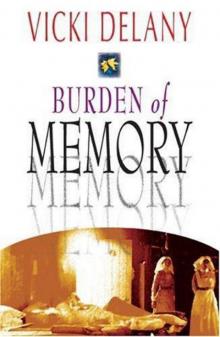 Burden of Memory
Burden of Memory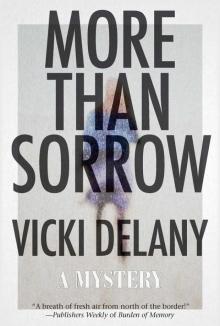 More Than Sorrow
More Than Sorrow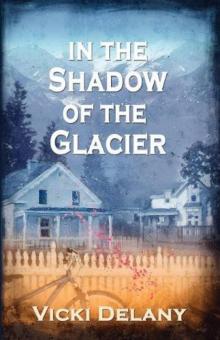 In the Shadow of the Glacier
In the Shadow of the Glacier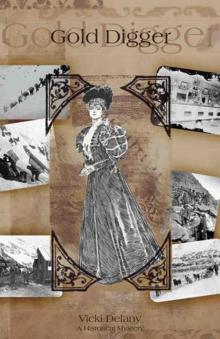 Gold Digger: A Klondike Mystery
Gold Digger: A Klondike Mystery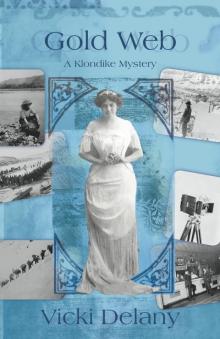 Gold Web
Gold Web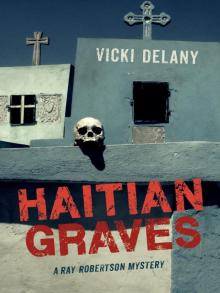 Haitian Graves
Haitian Graves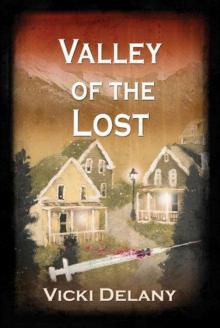 Valley of the Lost
Valley of the Lost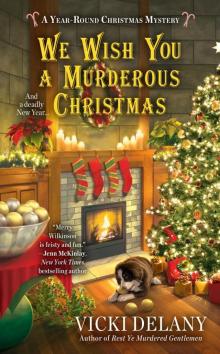 We Wish You a Murderous Christmas
We Wish You a Murderous Christmas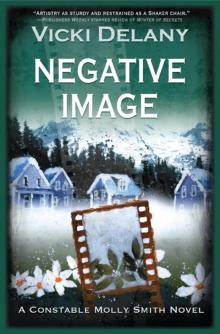 Negative Image
Negative Image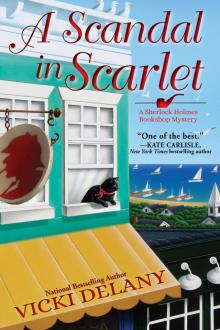 A Scandal in Scarlet
A Scandal in Scarlet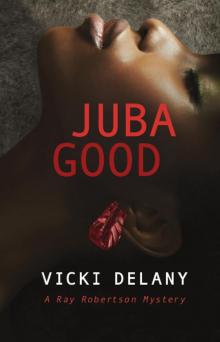 Juba Good
Juba Good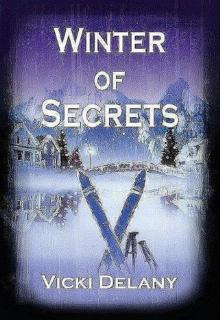 Winter of Secrets
Winter of Secrets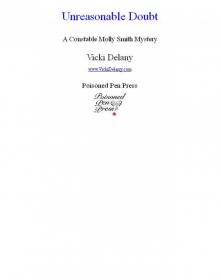 Unreasonable Doubt
Unreasonable Doubt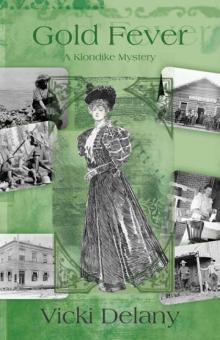 Gold Fever
Gold Fever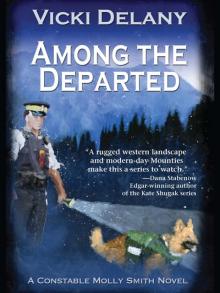 Among the Departed
Among the Departed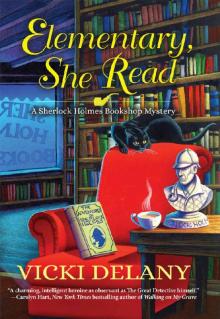 Elementary, She Read: A Sherlock Holmes Bookshop Mystery
Elementary, She Read: A Sherlock Holmes Bookshop Mystery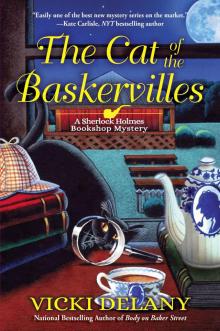 The Cat of the Baskervilles
The Cat of the Baskervilles